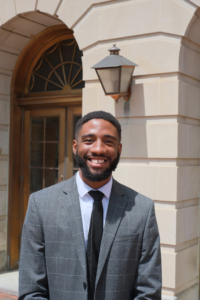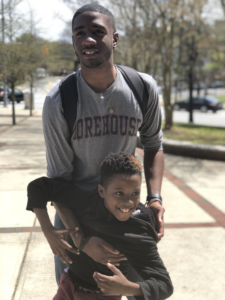Over the years, we’ve been blessed to work with many incredible volunteers. Often, they come to us from Historically Black Colleges and Universities (HBCUs) and are able to connect with the students in ways that impact them both.
Natane Eaddy works at the Arthur M. Blank Family Foundation as a Program Officer. Volunteering at RE inspired her to pursue a path that focused on improving outcomes for youth. “I learned patience,” she says. “I became more compassionate because my RE youth poured more into me than I could ever pour into them.”
Ava Hanks teaches in Atlanta Public Schools. She says, “RE taught me how to develop meaningful relationships with my students in order to provide them with an equitable and engaging learning experience.”
But it’s not just about tutoring and mentorship. For many volunteers, it’s about walking alongside their students and broadening their own horizons even as they work to broaden their students’.
Troy Brown, currently an educator in Mississippi, remembers a trip we took to Cirque Du Soleil: “RE created a lot of first time experiences for the students, but for me as well. That was my first time at a circus and I was having just as much fun as the kids were.”

Another past volunteer was Quinton Jenkins. He was a student at Morehouse College at the time, and after graduating with honors, he went on to receive a Master’s in Public Health from The University of Michigan. As an Albert Schweitzer Fellow there, he designed and implemented a community-based youth program that trained local Detroit youth on environmental justice, advocacy, and awareness strategies.
“I have spent much of my adult life figuring out how to shift the paradigm of power and resources back into the most vulnerable and underserved communities,” he says.
As a current medical student at Georgetown University School of Medicine, he’s working to “to change the narrative by advancing a culture of health equity through medical care and public health.” Quinton says that his time at RE played a big part in his decision to become a physician.

After long afternoons teaching, he remembers often having to walk students home who didn’t have a ride. “Our walking conversations ranged from the Power Puff Girls and Pokémon to not knowing if they would eat dinner that night. On these walks, in each of my students, I saw myself: A young black student yearning for the opportunity to thrive in a system that did not work to understand, respect, or support them.”
As a volunteer at RE, what you do is important, but even more important is what you are. For the students that Quinton taught, he was that figure working to understand, respect, and support them. And for Quinton, they were an opportunity to set the record straight and offer the kind of support he knows youth deserve.
Volunteering doesn’t just change the lives of the students, it changes the volunteers as well. We’re grateful to have had many incredible volunteers over the years, and we cherish both the impact they have had, and their willingness to be impacted in return.